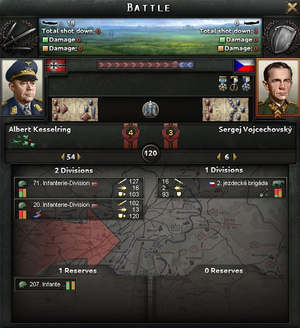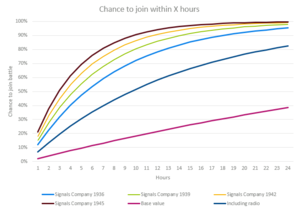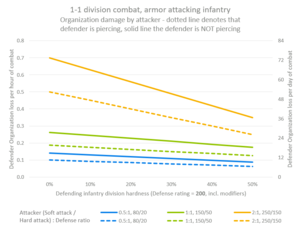A land battle is resolved in one hour turns, where both the attacking and defending divisions each randomly choose an opposing division to fight against this turn. In the following we refer to as the "attacker" the side who is on the offensive and initiated the battle and as "defender" the side which was attacked. A specific attacking and defending unit then depends on the combat phase and can refer to unit on either side.
战术
- 主条目:Combat tactics
战斗开始时会选择战术,每过12小时会变更一次。
战斗宽度
在战斗中,每个师的战斗宽度将被相加在一起,以确定有多少个师与前线宽度相适应并参加战斗。多线进攻时,战斗的可用宽度会增加,所以当战斗宽度是部队进攻的限制因素时,需要多线进攻以增加战斗宽度。战斗宽度也受特定的战术影响. 战场的基本战斗宽度是80,每个额外的进攻方向将增加40战斗宽度。
师的作战宽度是所有营的宽度之和。步兵营(包括摩托化步兵、机械化步兵和特种部队)、坦克营和反坦克营的作战宽度是2,炮兵营和自行火炮营(SPG)的作战宽度是3,反坦克营、防空营的作战宽度是1。支援连不占用作战宽度。人海突击学说科技树的两个分支中的The Vast Offensives和Human Wave Offensive可以降低步兵营0.4的作战宽度,意味着相同的作战宽度能够多挤进25%的步兵。
作战时会从预备队中抽调师加入作战,除非超宽惩罚达到33%。超宽惩罚的计算方法是2 * (总宽度 - 战场宽度) / 战场宽度,这说明在80宽的战场上,可以有93宽的作战部队进行战斗(32.5%的惩罚),但94宽就不可以了(35%的惩罚)。
预备队
战斗宽度不适合的师,或者是在战斗开始后才加入战斗的师,将会进入预备队。在预备队中的单位不能以任何方式为己方做出贡献,不能恢复组织度,也不能提高堑壕等级和计划准备加成。
在预备队中的单位在现场宽度容许的情况下,每小时都有几率加入战斗。基础几率只有每小时2%(平均增援时间是35小时)。增援几率可以通过研究无线电科技、师速度、陆军学说和通信支援连获得很大的提高。
防守时,如果所有前线师都被击退而预备队仍有部队,预备队中的部队也被迫随着前线师一同撤退。进攻也是同样道理,如果所有前线师的组织度耗光而预备队还有有组织度的部队,整体的攻势也会终止。
作为防守方,应当在预备队中及时放置部队,令其有时间增援前线,且不会被迫撤退,甚至击溃。如果战斗是满宽度预备队还有可用的部队,可以考虑手动将组织度很低的防守部队一次一支地撤到后方的一个地块,这样这些部队就能恢复组织度而预备队中的部队就能填补前线。否则,己方就会面临前线部队的组织度都处在低水平,预备队无法增援而被同时击退的风险。
如果是进攻方,可以考虑不要让超过现场宽度的部队进攻,这样这些部队就不会待在预备队中,还能够恢复组织度并获得计划加成。如果战场宽度允许,而预备队中还有部队(有部队抵达,或前线有部队组织度耗光),防守方的所有单位都处于战斗中,可以考虑不等待增援,而是手动停止战斗,然后再一同进攻,这样所有单位就可以立刻加入战斗了。
进攻
对人员杀伤和对装甲杀伤是对防守师的杀伤数值。防守部队的装甲率决定着该部队吸收对人员杀伤和对装甲杀伤的比率。例如,一支100%装甲率的部队会受到全部的对装甲杀伤,而不受到对人员杀伤;而一支25%装甲率的部队会受到25%的对装甲杀伤和75%的对人员杀伤。
如果进攻部队的穿甲深度低于防守部队的装甲厚度,则实际的对杀伤值减半。
在计算可能的伤害之前,先对杀伤值与防守部队的防御值进行比较。参见伤害结算部分。
Defenses
The attacker's Breakthrough values are used to determine how many defenses each of the attackers' units has. This is compared to the defenders' units hard and soft attacks to evaluate damage done to the attackers' units.
The defender's Defense values are used to determine how many defenses each of the defenders' units has. This is compared to attackers' units hard and soft attacks to evaluate the damage done to the defenders' units.
伤害结算
In damage dealing, the number of attacks is round(hardness modified attack / 10) and the number of defenses is round(defense / 10) (round(x) is random and defined as round(x) = ⌊x⌋ + Bernoulli(x - ⌊x⌋)). Both are integers.
每次进攻都有命中和未命中的可能,命中时会造成敌方HP和组织度受损。每次进攻过后,防守方单位移除1点防御值(若仍有剩余),而真正的命中几率取决于防守方有无防御值剩余。当一个单位有防御值剩余时,对攻击的基础躲闪几率为90%。如果防守单位已无剩余防御值,其躲闪几率降低至60%。
For each hit, the amount of possible damage done is random; a "die" is used to randomly choose the amount of damage done. For HP damage, the die size is 2 and for organization damage, it is 4. The exact amount of damage done to HP and organization per hit is calculated by multiplying the obtained die rolls with the damage modifiers (0.05 base modifier, tactics attack modifiers, and -50% when the target's armor is greater than the opponent's piercing). Other modifiers affect the number of attacks, thus the number of hits, but not the amount of resulting damage per hit.
When armored units are in combat against targets with insufficient piercing, the organization dice size is increased to 6, representing the ability of the armored unit to move more freely under fire, obtain better positioning and thus deal more damage. This means an unpierced armored unit on average does 3.5 organization damage per hit instead of 2.5, or 40% more damage per hit.
The damage done to a unit's HP reduces its manpower and equipment proportionally by HP loss percentage, in addition to equipment loss from attrition. The fighting strength of the unit is the minimum between the ratios of manpower and equipment IC. A unit's damage output is scaled by its fighting strength. The scaling is rounded to multiples of 10%, e.g., for strength less than 100% but greater or equal to 90%, the damage output is scaled by 90%. Note that damage done to a unit's HP does not change the other stats of the unit before the combat is finished.
举例说明上述机制:1个对人员杀伤1000的装甲师进攻,1个防御500的步兵师防守。
- 50次进攻受到抵抗;50次进攻未受抵抗。50 attacks against defense; 50 attacks against no defense.
- 50次进攻的命中几率为1 - 90% = 10%;50次进攻的命中几率为1 - 60% = 40%。
- 步兵师平均被命中50 * 0.1 + 50 * 0.4 = 25次。
- 计算组织度损失需要掷骰子25次,单次的数学期望为(1 + 6) / 2 = 3.5。
- 装甲师的战斗强度受损,略小于100%,故伤害输出向下修正至90%。
- 总结,装甲师预计每小时造成25 * 3.5 * 90% * 0.05 = 3.9点伤害。鉴于一个常规的步兵师的组织度为50-60,战斗预计将于半日后结束。
当一方有多个师参加战斗时,这些师可以将它们的杀伤值合并,以对抗防守方。例如,2个杀伤值100的师各自对单个防御值150的师。在此情况下,150点进攻“受阻”,有0.1的命中几率,而另外50点进攻“未受阻”,有0.4的命中几率。When more than one division participates from one side, they can combine their attack value to overcome the defense of the opposition. For example, two divisions with 100 attacks each pull their attacks versus single division with 150 defenses. In this situation 150 attacks will be considered "blocked" and have a 0.1 chance of hitting, while 50 attacks will be "unblocked" and have 0.4 chance of hitting.
Collateral damage
Infrastructure in the state and fortifications (naval fortifications for naval landings) in the province receive damage based on the attacker's attacks. The amount scales with the attacker's number of attacks, soft attack component and damage scaling factor. Damage against fortifications only occurs with a probability of 5% while infrastructure always gets damaged. Attacks by close air support do not cause collateral damage.
[math]\displaystyle{ \text{collateral damage} = 0.1 * \text{soft attack} * \#\text{ of attacks} * \text{damage dealing factor} }[/math][1]
The damage against infrastructure gets scaled further as described in Construction#Damage_and_repair.
![]() The Siege Artillery ability doubles both the probability and the damage against land forts.
The Siege Artillery ability doubles both the probability and the damage against land forts.
Combat factors
The following factors modify the number of attacks and/or defenses a unit has in combat (list is not exhaustive):
- Terrain: base penalties for attacker -20% in a forest, -30% in hills, -60% in mountains.
- River crossing: penalty of -30% or -60% for attacker attack and breakthrough depending on the river size
- Night: penalty of -50% for attacks of both sides
- Fort: penalty for attacker attack and breakthrough of -15% per fort level. Each extra attacking direction cancels out one fort level but not the last level.
- Encirclement: penalty for defender -30%
- Enemy air superiority: penalty for defender defense or attacker breakthrough.
penalty = enemy air superiority * (1 + enemy doctrine modifiers + terrain modifier + concealment advisor) * -0.35 + 0.7 * AA / (AA + 112)(the latter part is "enemy air superiority reduction"). - Low supply: scaling penalties up to -33% at no supply
- Exceeding combat width penalty: divisions in active combat can slightly exceed allowed combat width with a small penalty to offset this (-2% per extra combat width).
- Stacking penalty for having too many divisions in combat: (-2% per division over the stacking limit. The stacking limit is 8, plus 4 per flanking direction.
- In multiple combats: -50% for a division that is attacked from a different direction while already attacking
- Paradrop penalty: -30% combat penalty 48 hours after being paradropped.
- Amphibious penalty: -70%
- Commander skill, +5% per skill point for both attack and defense
- Planning bonus, the base maximum is +30% which can be further improved by a doctrine to +110%
- Entrenchment: +2% per each point built. Maximum achievable: 5 base + 11 engineer IV + 10 doctrine = +52%
- Air support: bonus to attack and defense (in addition to direct damage support planes do)
- Country bonus
- Division experience: -25% for green, 0 for trained, +25% for regular, +50% for seasoned and +75% for veteran
- Combat tactics
- Decryption advantage: +5% per decryption level compared to enemies average encryption level (ex: dec. level is 5 and enemy average enc. level is 3 then 5-3 = 2 which gives 10 % increase)
All positive factors stack with each other multiplicatively, so it is possible to reach very high values in a very good tactical situation.
For example:
- experience +75%
- entrenchment +40%
- terrain +20%
- country +40%
- commander skill +35%
Multiplied together this gives your unit +556% to base stats (1.75*1.4*1.2*1.4*1.35=5.56)
The final factor is capped at 1% if the multiplied value is lower.
Equipment damage
During combat, the ratios of equipment and manpower losses are updated to 70% of the loss in strength ratio. The stats of the unit are locked during the combat if the template is unchanged, and are updated after the combat.



